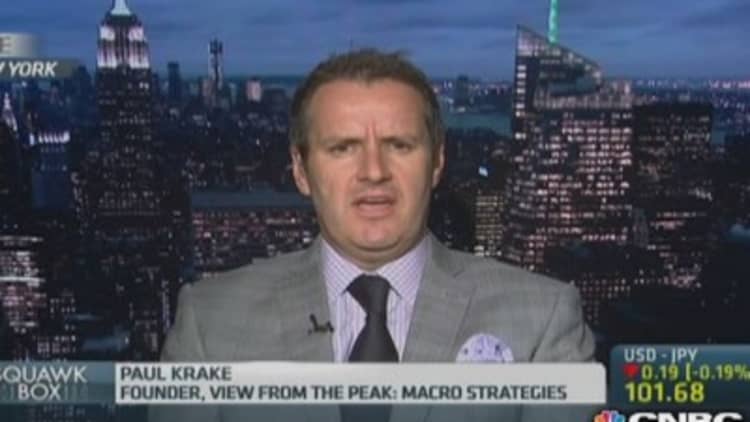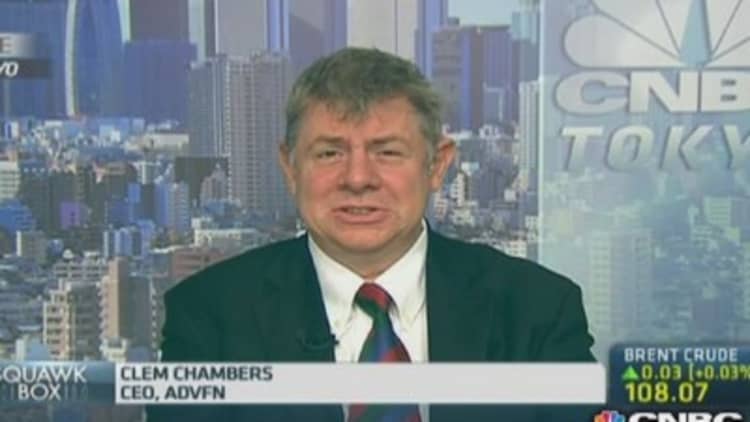Japan's stock market has faced a rough month so far, continuing to shed last year's gains as analysts grow disillusioned over the pace of promised reforms.
"They're taking the policy premium out of the market," said Ben Collett, head of Asian equities at Sunrise Brokers.
The Nikkei ended down 1.4 percent at 14,096.59 Friday, bringing May losses to around 1.5 percent. The index has erased more than 13 percent of its value so far this year, making it one of the worst-performing major global indexes, with foreign investors pulling around $14.9 billion out of Japanese funds over the period, according to data from Jefferies.
Read More Japan's economy grows at fastest pace in nearly 3 years
Investors pushed Japanese shares up more than 50 percent last year on hopes that Abenomics, or the more than one-year-old plan from Japanese Prime Minister Shinzo Abe, would kick-start Japan's long-moribund economy out of its decades-long struggle against the pressures of deflation.
The "first arrow" of Abenomics was aggressive easing from the Bank of Japan, led by Gov. Haruhiko. It was followed by a "second arrow" of ambitious government spending, but the "third arrow" of structural reforms remains elusive.
"The market is pricing in that Abe and Kuroda aren't going to do anything this quarter," Collett said.

Read MoreKuroda: Impact of Japan tax hike will be contained
Also weighing on policy expectations, Japan's gross domestic product (GDP) grew by 5.9 percent in the first quarter, its fastest pace in almost three years and well above analyst expectations of 4.2 percent in a Reuters poll.
While many analysts believe the pop in growth was due to a consumption binge before a sales tax increase to 8 percent from 5 percent on April 1, the GDP data suggest the Bank of Japan may not step up easing measures as the market has been counting on.
"To turn (the market) around, you do need to see some counter-measures here," said Jesper Koll, head of Japanese equity research at JPMorgan. "There's a lot of frustration growing. It's basically Abenomics fatigue and a lack of concrete steps," he said.
Read More Womenomics: Japan's new growth bazooka?
"Company specific growth strategies are encouraging, but short term, the market moves on either the Bank of Japan or concrete steps by Prime Minister Abe or his team," Koll said.
To be sure, Koll believes the selloff offers a good buying opportunity.
"The market is not giving any premium to the earnings performance that companies are putting in," Koll said.
Collett expects the market may find support around current levels, although with the Nikkei heading its year-to-date low around 13,885, there's a bit of nervousness in the market, he said.
Even absent fresh policy moves from either the Bank of Japan or the government, some analysts see longer-term drivers that may push the market back onto an uptrend.

Read MoreJapan's jobs market is getting tighter
Deutsche Bank expects the new five-yearly plan from Japan's pension funds, due by June, could result in anywhere from $50 billion to more than $100 billion in fresh money headed into domestic equities.
Japan's pension fund assets are the second largest globally after the U.S., holding around $2 trillion in 2012, Deutsche Bank said in a report last week. Under pressure to boost returns amid a quickly aging population, the pension funds are expected to take on more risk, increasing equity allocations while cutting bond holdings, it said.
Another factor which may provide longer-term support for shares: Jefferies expects companies will soon announce more share buybacks as Abenomics is already pushing them to dip into the $2.17 trillion they'd hoarded by the end of last year.
Read More Shinzo Abe: The second opening of Japan
"In a world of deflation, it was sensible for companies to deleverage or invest in JGBs (Japanese government bonds)," Jefferies said in a note last week. But with inflation becoming a reality, "the cash becomes a curse," it said.
"Companies can efficiently choose to allocate money to buy-back shares (or issue more dividends), invest in the business or buy other companies," Jefferies said.
—By CNBC.Com's Leslie Shaffer; Follow her on Twitter @LeslieShaffer1

